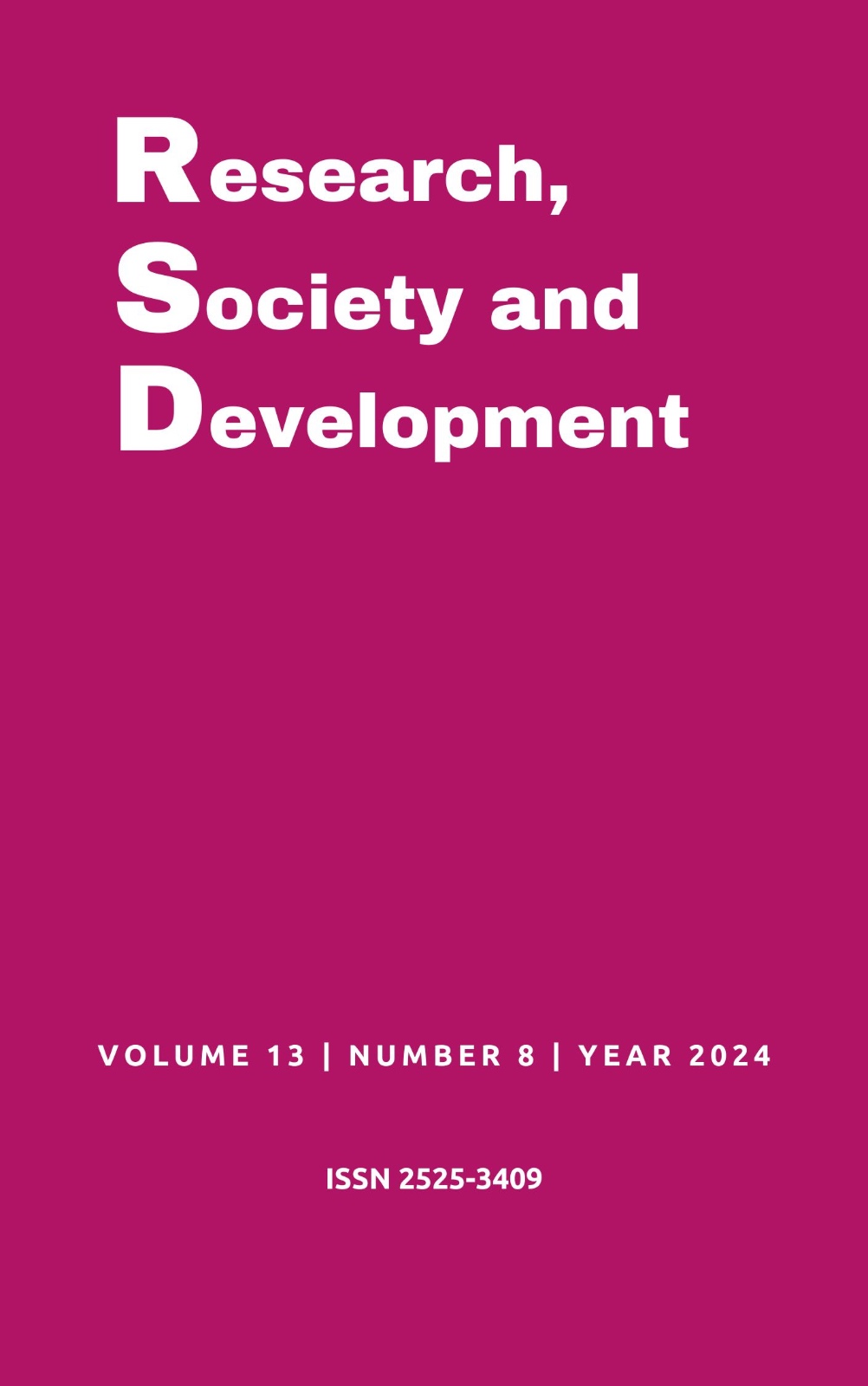A relação entre depressão e ansiedade e a realização na vida em estudantes de escolas de tempo integral no Ceará
DOI:
https://doi.org/10.33448/rsd-v13i8.44879Palavras-chave:
Abordagem multidisciplinar, Promoção da saúde mental, Escolas de período integral, Bem-estar holístico.Resumo
A presença de uma equipe multidisciplinar é fundamental para promover o bem-estar mental abrangente em escolas de período integral. Este artigo destaca a importância da colaboração entre diversas profissões para abordar vários aspectos da saúde mental dos alunos. Optometria, psicologia, terapia ocupacional, educação física e nutrição são fundamentais para promover uma abordagem holística da saúde mental. Os optometristas contribuem com a avaliação da saúde visual, reconhecendo o impacto de problemas visuais não resolvidos no desempenho acadêmico e na saúde mental. Os psicólogos se concentram em avaliações e intervenções emocionais, capacitando os alunos a lidar com o estresse e a ansiedade por meio de habilidades de enfrentamento e desenvolvimento de resiliência. Os terapeutas ocupacionais envolvem os alunos em atividades que aprimoram as habilidades socioemocionais e promovem um senso de realização. Os instrutores de educação física e os nutricionistas promovem hábitos de vida saudáveis, com atividade física regular e uma dieta equilibrada, essenciais para o bem-estar mental dos alunos, influenciando positivamente o humor e a concentração. A colaboração dessas disciplinas forma um sistema de suporte abrangente, no qual a optometria trata da saúde visual, a psicologia trata da saúde emocional, a terapia ocupacional aprimora as habilidades práticas e a educação física e a nutrição cultivam estilos de vida saudáveis. Essa abordagem integrada ressalta a interconexão dessas profissões e seu impacto coletivo sobre a saúde mental geral e o sucesso acadêmico dos alunos. Com a adoção de uma estratégia multidisciplinar, as instituições educacionais podem criar um ambiente que priorize o bem-estar mental, nutrindo alunos que não sejam apenas academicamente proficientes, mas também mentalmente resilientes e capacitados. Este documento enfatiza que uma abordagem holística que envolva vários profissionais da saúde e da educação é essencial para a criação de ambientes de aprendizagem favoráveis e eficazes em escolas de período integral.
Referências
Ahmadi, N., Nabavi, S. M., Hajsadeghi, S., & Moghadami, M. (2015). Relationship between occupational therapy, health and well-being. Acta Medica Iranica, 53(11), 691-695.
American Association for Pediatric Ophthalmology and Strabismus. (2021). What is pediatric ophthalmology? https://aapos.org/patients-and-public/eye-conditions/what-is-pediatric-ophthalmology
American Occupational Therapy Association. (2021) Occupational therapy and mental health. https://www.aota.org/Practice/Health-Wellness/Mental-Health.aspx
American Optometric Association. (2021). Children’s vision. https://www.aoa.org/healthy-eyes/eye-and-vision-conditions/childrens-vision
American Psychological Association. (2021). How psychologists help with mental health. https://www.apa.org/topics/mental-health/how-therapists-help
Australian Government Department of Health. (2019). Health and wellbeing. https://www.health.gov.au/health-topics/health-and-wellbeing
Canadian Association of Occupational Therapists. (2021). Occupational therapy and mental health. https://www.caot.ca/site/aboutot/otandmh?nav=sidebar
Centers for Disease Control and Prevention. (2021). School health guidelines for promoting healthy eating and physical activity. https://www.cdc.gov/healthyschools/npao/promoting-healthy-eating.html
Escolas de Ensino Médio em Tempo Integral (EEMTI). Secretaria da educação do estado do Ceará. 2023. Disponível em: https://www.seduc.ce.gov.br/escolas-de-ensino-medio-em-tempo-integral-eemti/
Green, J., & Goldwyn, R. (2002). Annotation: Attachment disorganization and psychopathology: New findings in attachment research and their potential implications for developmental psychopathology in childhood. Journal of Child Psychology and Psychiatry, 43(7), 835-846.
Jorm, A. F., & Kelly, C. M. (2007). Improving the public's understanding of the terms 'mental disorder' and 'schizophrenia': A randomized controlled trial. Psychological Medicine, 37(11), 1627-1636. doi:10.1017/S0033291707001129
Literature review as a research methodology. Journal of Business Research, 104, 333-339.
Mrazek, P. J., & Haggerty, R. J. (1994). Reducing risks for mental disorders: Frontiers for preventive intervention research. National Academies Press.
National Association of School Nurses. (2021). Mental health in schools. https://www.nasn.org/nasn-resources/practice-topics/mental-health
National Association of School Psychologists. (2021). School psychologists: Providing mental health services. https://www.nasponline.org/standards-and-certification/professional-conduct-ethical-practice/providing-mental-health-services
National Institute of Mental Health (NIMH). (2021). Child and adolescent mental health. https://www.nimh.nih.gov/health/topics/child-and-adolescent-mental-health/index.shtml
Patalay, P., Gage, S. H., & Goodman, A. (2017). Mental health and wellbeing trends among children and young people in the UK, 1995–2014: Analysis of repeated cross-sectional national health surveys. Psychological Medicine, 47(6), 1275-1285.
Patel, V., Flisher, A. J., Hetrick, S., & McGorry, P. (2007). Mental health of young people: A global public-health challenge. The Lancet, 369(9569), 1302-1313.
Patel, V., Saxena, S., Lund, C., Thornicroft, G., Baingana, F., Bolton, P., & Lancet Global Mental Health Group. (2018). The Lancet Commission on global mental health and sustainable development. The Lancet, 392(10157), 1553-1598.
The Lancet. (2020). The state of mental health services: Learnings from the COVID-19 pandemic. The Lancet, 396(10247), 1315.
Thomas, D. P., Martin, C. K., Heymsfield, S., & Redman, L. M. (2019). Effect of dietary adherence on the body weight plateau: A mathematical model incorporating intermittent compliance with energy intake prescription. The American Journal of Clinical Nutrition, 110(4), 872-879.
U.S. Department of Education. (2019). Every Student Succeeds Act (ESSA). https://www.ed.gov/essa
World Federation for Mental Health. (2021). World Mental Health Day. https://wfmh.global/world-mental-health-day/
World Federation of Occupational Therapists. (2021). Occupational therapy and mental health. https://www.wfot.org/programmes/mental-health/
World Health Organization. (2014). Mental health: a state of well-being. https://www.who.int/features/factfiles/mental_health/en/
World Health Organization. (2020). Mental health in schools: A resource and training pack for teachers and other professionals. https://www.who.int/mental_health/media/en/712.pdf
World Health Organization. (2020). Promoting mental health: Concepts, emerging evidence, practice. https://www.who.int/mental_health/evidence/best_practice_guidance/en/
Downloads
Publicado
Edição
Seção
Licença
Copyright (c) 2024 Luiz Aldir da Silva; Leandro Freitas Oliveira

Este trabalho está licenciado sob uma licença Creative Commons Attribution 4.0 International License.
Autores que publicam nesta revista concordam com os seguintes termos:
1) Autores mantém os direitos autorais e concedem à revista o direito de primeira publicação, com o trabalho simultaneamente licenciado sob a Licença Creative Commons Attribution que permite o compartilhamento do trabalho com reconhecimento da autoria e publicação inicial nesta revista.
2) Autores têm autorização para assumir contratos adicionais separadamente, para distribuição não-exclusiva da versão do trabalho publicada nesta revista (ex.: publicar em repositório institucional ou como capítulo de livro), com reconhecimento de autoria e publicação inicial nesta revista.
3) Autores têm permissão e são estimulados a publicar e distribuir seu trabalho online (ex.: em repositórios institucionais ou na sua página pessoal) a qualquer ponto antes ou durante o processo editorial, já que isso pode gerar alterações produtivas, bem como aumentar o impacto e a citação do trabalho publicado.


